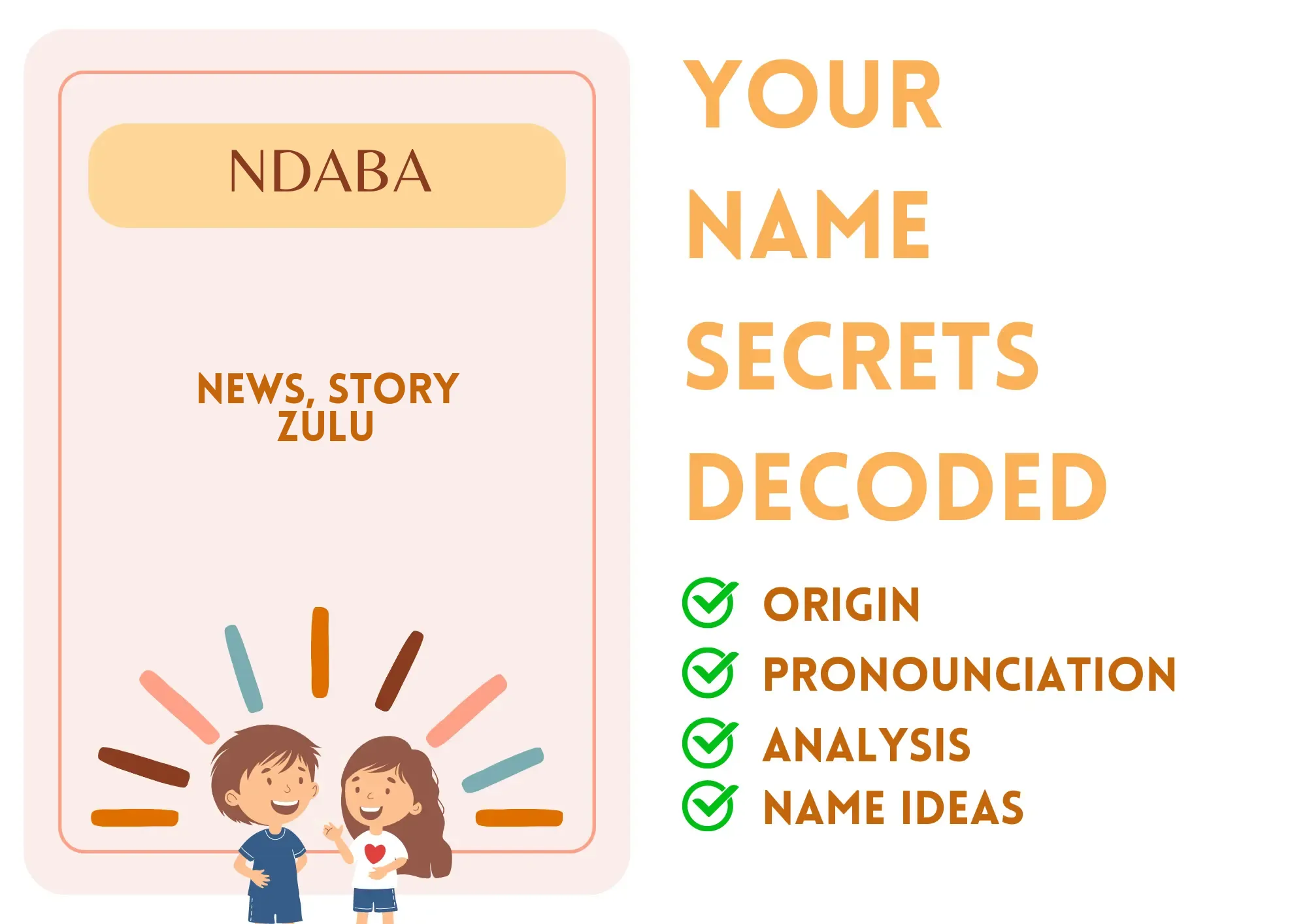
Ndaba
Ndaba is a name of African origin, particularly associated with Zulu culture, and it translates to 'news' or 'story.' It is used as a given name and can signify the importance of storytelling and communication within the culture. Although predominantly masculine, it is not strictly gendered and can be used for females as well.
In many African cultures, names hold significant meanings and symbolize various aspects of life and community. Ndaba is embraced for its connection to tradition and the oral storytelling heritage, values held dear by numerous tribes.
People generally feel positively about the name Ndaba, associating it with a sense of heritage, wisdom, and community. It is relatively easy to pronounce and write, contributing to its appeal. Common nicknames include Nda and Daba.
The name Ndaba, while not frequently featured in mainstream popular culture, resonates deeply within African literature and narratives, often representing the essence of sharing and passing down knowledge through stories.
Basic Information
Gender: Unisex
Sounds Like: n-DAH-bah
Pronunciation Explanation: The emphasis is on the second syllable 'DAH', pronounced with a clear 'n' at the beginning.
Summary and Meaning
Meaning: news, story (Zulu)
Origin: The name Ndaba has its roots in Zulu culture, one of the ethnic groups in South Africa known for their rich oral traditions.
Usage: While Ndaba is usually used as a masculine name, it can also be adopted as a unisex name.
Name Number (Chaldean)
Name Number (Pythagorean)
Popularity (Global Rank)
Overall: 53951
Boys: 45944
Girls: 77177
Most Popular in
Religious and Cultural Significance
Religion: African Traditional
Background: In Zulu culture, Ndaba is not directly tied to a specific religion but is more connected to cultural practices and the importance of storytelling in community life.
Cultural Significance: Ndaba celebrates the tradition of sharing and storytelling, reflecting the importance of communication in the Zulu community.
Historical Significance: The name has historical significance in Zulu culture, where oral storytelling is a vital part of preserving history, culture, and morals across generations.
Popular Culture
Literature and Mythology: Ndaba may not be directly featured in popular literature, but the practice of storytelling is a dominant theme in many African narratives.
Movies and Television: While not widely recognized in movies or shows, Ndaba reflects the essence of Zulu storytelling traditions that can be observed in numerous cultural productions.
Feelings and Perceptions
Perception: Ndaba is viewed positively for its cultural resonance and connection to storytelling, embodying wisdom and community spirit.
Positive Feelings: Cultural, wise, traditional, meaningful, communal.
Negative Feelings: Some may find it difficult to pronounce or unfamiliar if not versed in African names.
Practical Considerations
Ease of Writing and Calling: The name Ndaba is fairly easy to write and pronounce, consisting of five letters and three syllables, making it memorable and simple to call.
Common Typos and Misspellings: Ndaba,Ndbah,Ndaaba
Common Nicknames: Nda,Daba
Ndaba Popularity
Ndaba Usage and Popularity By Country
| Country | Rank (Overall) |
|---|---|
| Lesotho | 1160 |
| Zimbabwe | 2206 |
| Zambia | 3102 |
| South Africa | 3493 |
| Iceland | 5176 |
| Malawi | 5294 |
| Bahrain | 9628 |
| Senegal | 10065 |
| Tanzania | 10770 |
| New Zealand | 20916 |
Ndaba Usage and Popularity By City
| City | Rank (Overall) |
|---|---|
| Johannesburg | 3272 |
| Durban | 3549 |
| Cape Town | 7425 |
| Bloemfontein | 2783 |
| Boston | 14244 |
| Dallas | 16378 |
| Welkom | 857 |
| Nelspruit | 1953 |
| London | 35343 |
| Yellowknife | 337 |
Compatibility Analysis
Famous Persons Named Ndaba
Related Names
Similar Sounding Names:
Nola,Nadia,Nerida,Daba